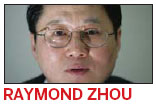Sure, the production value of CCTV's New Year's gala is much better now than it was during the mid-1980s, when the television event was conceived. But to be honest, I'm no longer drawn to it. Like many of my peers, I love to hate it. I take only a few quick glances at the television during the show because that is the only way I can appease my parents. Yes, they love it. When I watch it with my parents, I have to be on my best behavior and I must hide my cynicism at the most homey moment of the year.
The most watched variety show in the world is by no means a reflection of China's reality. It is a saccharine version of forced joy that is a pain to watch. Peek into any home or restaurant and you'll find a much more spontaneous and heart-warming display of Chinese festivities.
After numerous rounds of censorship, the comedy skits are now so toothless they amount to self-parodies. The actor Zhao Benshan, for whatever reason, manages to squeeze in a few good jokes, which have turned him into a perennial presence on the show and the raison d'etre why so many cannot shake off the habit of watching. You may spot a few Internet memes on the show, but they are stripped of satirical meaning and sound peculiar and out-of-place. It was an anomaly that Xiao Shenyang, Zhao's apprentice, got through as a cross-dressing waiter and became an overnight sensation. Many of the top comedians, such as Zhou Libo and Guo Degang, have been outspoken about the fact they have never appeared on the show and do not intend to.
On the gala stage, you will not be able to find Cui Jian, arguably the greatest Chinese singer of the past three decades, a singer who truly encapsulates the zeitgeist. The show has a style all its own that is best described as kitsch but is often mistaken for high art by those not in the know. It adopts an approach of "the more the better" toward everything. Each year, a song is usually shared by a dozen singers, each mouthing a couple of lines. The stage is crammed with sprightly colors and moving images. The only pauses come in the form of melodramatic skits that tout the virtues of certain professions and the reading of telegrams from around the world, as if people still send telegrams these days.
But there is no doubt that millions in China are hooked on this show - they are, after all, conditioned by decades of such theatrics and blatancy on the tube. Of course, in an era of diversity, nobody can produce a single show that satisfies every social segment.












